Fruits have a key role in the famous Mediterranean Diet plan. Eating a bowl of fruit salad can skyrocket your nutrient intake with fewer than 100 calories. Among others, fruit salads support good health, weight loss, and a good night’s sleep.
Benefits of Fruits for Weight Loss & Health
Fruits offer a wide range of benefits for weight loss and overall health, especially when included as part of the Mediterranean diet, which emphasizes fresh, whole foods.
Rich in Nutrients – Low in Calories
Fruits are packed with essential vitamins, minerals, antioxidants, and fiber, yet they are generally low in calories, making them an excellent choice for weight loss.
| calories | fiber (grams) | sugar (grams) | magnesium (mg) | potassium (mg) | vitamin C (mg) | |
|---|---|---|---|---|---|---|
| orange | 46 | 2.4 | 9 | 10 | 169 | 45 |
| banana | 89 | 2.6 | 12.2 | 27 | 358 | 9 |
| avocado | 167 | 6.8 | 0.3 | 29 | 507 | 9 |
| apple | 57 | 2.4 | 10 | 5 | 100 | 4 |
| kiwi | 64 | 3 | 9 | 16 | 198 | 75 |
| watermelon | 30 | 0.4 | 2.5 | 10 | 112 | 8 |
| pear | 59 | 3.1 | 9.7 | 7 | 104 | 4 |
| mango | 60 | 1.6 | 13.7 | 10 | 168 | 36 |
| grapes | 80 | 0.9 | 16.1 | 7 | 218 | 3 |
| pineapple | 60 | 0.9 | 11.4 | 13 | 137 | 59 |
| cherries | 63 | 2.1 | 12.8 | 11 | 222 | 7 |
| cranberries | 46 | 3.6 | 4.3 | 6 | 80 | 14 |
Sugar
The natural sugars in fruits, such as fructose, provide a quick source of energy without the blood sugar spikes caused by processed foods. This makes fruits a great pre-workout snack or mid-day energy booster in the Mediterranean diet.
Control Appetite
Fruits are a great source of dietary fiber, which promotes satiety and aids in digestion. Fiber helps regulate blood sugar levels and reduces cravings, which can contribute to weight loss. Fiber also plays a role in preventing constipation, aiding in healthy digestion, and supporting gut health.
May improve digestion
The fiber and water content in fruits aid in smooth digestion, preventing constipation, bloating, and discomfort. A healthy digestive system is essential for nutrient absorption and metabolism, supporting weight loss efforts.
Fiber contributes to healthy gut microbiota which protects the body from chronic low-grade inflammations and improves metabolic processes.
If you have a sensitive stomach, add kiwi to your favorite fruit salad. Kiwi contains the proteolytic enzyme actinidin, which helps break down food proteins.[2]
Other fruits, such as pineapple and papaya, have potent enzymatic properties as well.[3]
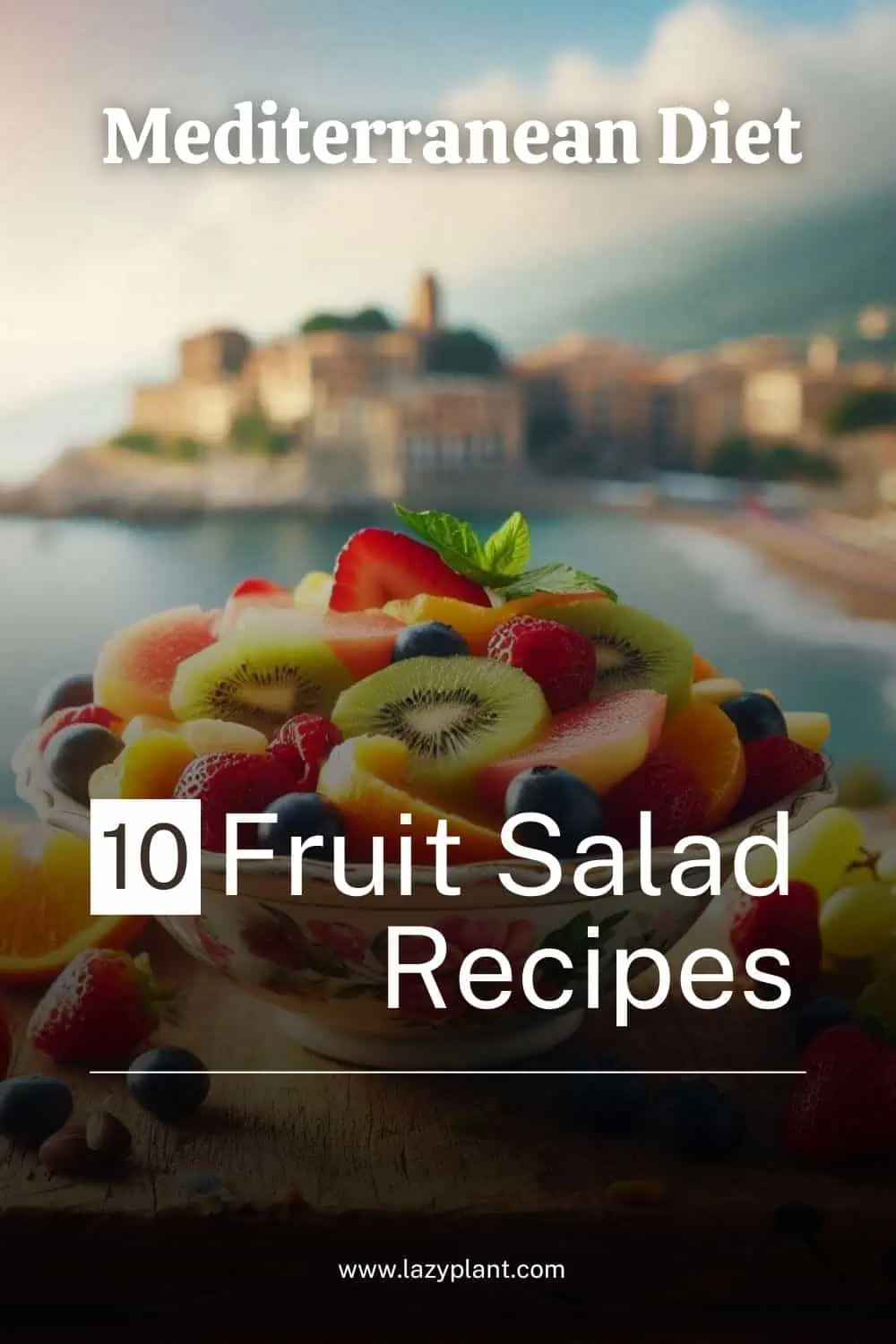
Hydration
Most fruits have high water content (more than 80%). The hydration they offer helps maintain proper bodily functions and contributes to feeling full, reducing the tendency to overeat.
A well-hydrated body has a better metabolism, improved insulin sensitivity, and increased lipolysis! It burns more belly fat.[4]
A fruit salad hydrates the body better than tap water, as fruits are natural water filters. They contain high-quality, purified water! Furthermore, fruits contain electrolytes! Replenishing electrolytes, such as calcium, magnesium, potassium, and phosphorus, is important for proper hydration.
Potassium
Fruits are particularly rich in potassium, with a bowl of fruit salad providing 8-24% of the Daily Value! Most people consume less potassium than they need. The standard Western diet is low in this important mineral. A potassium-rich diet has been linked to a decreased risk of obesity and elevated Body Mass Index.
Manganese
Other minerals found abundantly in fruits are manganese and copper.
Manganese is essential for the synthesis of certain enzymes that are involved in many metabolic functions of the body. Obese people in particular have significantly lower concentrations of manganese.[5]
The richest fruit in manganese is pineapple, with 30% DV per serving, while other common fruits like banana, cranberry, avocado, and grapes provide 3-10% DV.
Copper
A cup of fruit salad provides about 10% of the Daily Value! Adequate amounts of copper are necessary for weight loss, as it’s involved in the synthesis of leptin hormone. Also, it contributes to a lower body mass index. Copper imbalances may cause fat accumulation![6]
Antioxidants and Anti-Inflammatory Benefits
Fruits like berries, oranges, and grapes are rich in antioxidants, including flavonoids and polyphenols, which protect the body from oxidative stress and inflammation. These properties are key for reducing the risk of chronic diseases like heart disease, type 2 diabetes, and cancer, common goals in the Mediterranean diet.
Carotenoids
- beta-carotene is naturally present in melon, mango, and pink papaya
- lycopene is found in high amounts in watermelon and especially tomato
- lutein and zeaxanthin are indigenous to avocado, orange, kiwi, and cranberry
According to many studies, a diet high in carotenoids enhances weight loss efforts, helps burn belly fat, improves insulin sensitivity, and prevents obesity-associated adverse effects like inflammation.[7]
Melon, mango, and pink papaya are rich in beta-carotene, while avocado, orange, kiwi, and cranberry are the best sources of lutein and zeaxanthin.
Flavonoids
Flavonoids are found in berries, cherries, apples, and citrus fruits.[8]
Flavonoids in fruits help burn belly fat, regulate energy intake, prevent fat absorption, increase metabolism, and have a beneficial effect on gut microbiota! Also, flavonoids may improve cholesterol and triglyceride levels![9]
Resveratrol
Resveratrol is a natural component of berries and grapes. A diet high in resveratrol also helps overweight people lose weight, improve body mass index, and reduce waist circumference![10]
The richest common foods in resveratrol are berries, grapes, and peanuts. Thus, a PB&J sandwich may support your weight loss goals.
Vitamin E
As a powerful antioxidant, vitamin E helps protect cells from oxidative stress, reducing the risk of heart disease by preventing the oxidation of LDL cholesterol, which is a key factor in the development of atherosclerosis. It also helps maintain the integrity of blood vessels, regulates glucose metabolism, and promotes good circulation.
Additionally, vitamin E supports immune function and skin health, while its anti-inflammatory properties further protect the cardiovascular system from damage.
Mediterranean staples like nuts, seeds, leafy greens, and fish are excellent sources of vitamin E, ensuring that people who follow this diet typically meet their vitamin E needs without excessive oil consumption.
The richest fruits in vitamin E are avocado, mango, and cranberries, providing up to 11% DV per serving.
Vitamin C
Vitamin C plays a significant role in overall health and can have an impact on obesity management. As a powerful antioxidant, it helps reduce inflammation, which is often associated with obesity and metabolic disorders. It also supports the immune system, aids in tissue repair, and enhances the absorption of iron from plant-based foods.
Some studies suggest that low levels of vitamin C can be linked to increased body fat and a slower metabolism, as it’s essential for the synthesis of carnitine, a molecule that helps the body burn fat for energy. Additionally, adequate intake of vitamin C may help regulate blood sugar levels, reducing the risk of developing conditions like insulin resistance and type 2 diabetes, which are often linked to obesity.[11,12]
Fruits in the Mediterranean diet are an excellent source of vitamin C, with citrus fruits like oranges, lemons, and grapefruits being especially rich in this nutrient. Regular consumption of these fruits not only helps meet daily vitamin C needs but also promotes heart health and supports the body’s defense against chronic diseases.
Support Heart Health
Fruits in the Mediterranean diet play a crucial role in supporting heart health due to their rich antioxidant, fiber, and nutrient content.
Berries, citrus fruits, and pomegranates are loaded with antioxidants like flavonoids and vitamin C, which help combat oxidative stress and reduce inflammation, two major contributors to heart disease. These fruits also improve blood vessel function and reduce the risk of atherosclerosis.
Additionally, potassium-rich fruits such as bananas and oranges help regulate blood pressure by balancing sodium levels, lowering the risk of hypertension, which is a leading cause of heart disease.
Moreover, fruits high in soluble fiber aid in reducing LDL cholesterol levels by preventing its absorption into the bloodstream, reducing the risk of plaque buildup in arteries.
The anti-inflammatory properties of grapes, cherries, and pomegranates help protect the cardiovascular system from chronic inflammation, which can damage blood vessels.
By regulating blood sugar levels and promoting weight management through their low calorie and high fiber content, fruits support a healthy metabolism and indirectly contribute to heart health, lowering the risks of heart disease and related conditions like obesity and diabetes.
Fruit Salads are part of the Mediterranean Diet
Yes, fruit salads can definitely be part of the Mediterranean diet. This diet emphasizes fresh, seasonal, and locally grown produce, making fruit salads an excellent and refreshing way to enjoy a variety of fruits.
Fruits from the Mediterranean Region
Traditionally, fruits grown in the Mediterranean region include:
- Citrus fruits: Oranges, lemons, tangerines
- Figs: Both fresh and dried varieties
- Pomegranates: Commonly enjoyed in fall and winter
- Grapes: Often used fresh, dried as raisins, or made into wine
- Apples and pears: Common in the Mediterranean climate
- Stone fruits: Such as peaches, apricots, cherries, and plums
- Melons: Watermelons and cantaloupes are popular in summer months
- Olives: Though technically a fruit, olives are more often used for their oil or in savory dishes
- Dates: Especially popular in Mediterranean North Africa and the Middle East
What Fruits did Ancient Romans, Greeks & Egyptians Eat?
Ancient Romans, Greeks, and Egyptians enjoyed a variety of fruits, many of which are still popular in the Mediterranean region today. Their diets were rich in fresh, dried, and preserved fruits, often used in daily meals, desserts, and even medicinal remedies.
| Fruit | Ancient Romans | Ancient Greeks | Ancient Egyptians |
|---|---|---|---|
| Figs | Eaten fresh or dried, popular in daily diet | Valued for sweetness, dried for long storage | Central to diet, consumed fresh and dried |
| Grapes | Consumed fresh, dried as raisins, made into wine | Used for wine, eaten fresh or dried as raisins | Eaten fresh, dried, or used for winemaking |
| Apples | Eaten fresh, cooked, or made into sauces | Not as commonly noted in records | Less prominent but available |
| Pears | Cooked in honey or wine | Eaten fresh or used in desserts | Not common in Egyptian diet |
| Pomegranates | Introduced from the East, used medicinally | Associated with mythology and health benefits | Important in culture, depicted in tombs |
| Plums | Consumed fresh or dried | Rare mention in Greek records | Less common in Egypt |
| Cherries | Consumed fresh or dried | Less commonly eaten | Rarely mentioned |
| Olives | Mainly for oil production | Key in Greek diet for both fruit and oil | Grown but mainly used for oil |
| Quince | Rarely eaten fresh, mostly cooked | Fragrant, often cooked for sweetness | Not widely noted in Egyptian sources |
| Dates | Not common | Rarely mentioned | Staple food, eaten fresh or dried, in desserts |
| Melons/Watermelons | Occasionally consumed | Rarely mentioned | Grown along the Nile, important for hydration |
Are All Berries Allowed in the Mediterranean Diet Plan?
Yes, most berries are allowed and encouraged in the Mediterranean diet plan due to their high nutrient density and health benefits. Common berries like strawberries, blueberries, raspberries, and blackberries fit well within the diet due to their ability to support heart health, reduce inflammation due to their high anthocyanins and resveratrol content, and promote digestive health.
However, not all forms of berries are equally beneficial. Fresh and frozen berries are optimal, while dried berries, jams, and syrups should be consumed in moderation due to their higher sugar content. Processed versions of berries can still fit into the Mediterranean diet, but it’s essential to be mindful of added sugars and portion sizes. I only consume them rarely at desserts.
Can I Eat Exotic Fruits in the Mediterranean Diet?
You can eat exotic fruits in the Mediterranean diet, but locally produced fruits are generally preferred due to their seasonal freshness and environmental sustainability, two key principles in the diet.
Are Tropical Fruit Salads More Nutritious?
Tropical fruits like mango, pineapple, and papaya are not necessarily more beneficial than those made from Mediterranean fruits. Both types of fruits offer a wide range of health benefits. The key is variety, balance, and moderation. Combining different fruits, whether tropical or local, ensures a diverse intake of nutrients.
Can I Eat Ambrosia Fruit Salad in the Mediterranean Diet?
Ambrosia fruit salad is a sweet, creamy dessert typically made with a mix of fruits, often including mandarin oranges, pineapple, and shredded coconut, combined with mini marshmallows and a creamy dressing, which can be made from whipped cream, sour cream, or yogurt. It’s known for its rich, sweet flavor and is often served at gatherings or special occasions.
In terms of the Mediterranean diet, you can enjoy ambrosia fruit salad, but it should be done mindfully. Traditional Mediterranean cuisine emphasizes fresh, whole foods, and while ambrosia fruit salad includes fruits, the added sugars and processed ingredients (like mini marshmallows and creamy dressings) may not align with the diet’s principles focused on healthful fats, whole grains, and minimally processed foods.
To make it more compatible with the Mediterranean diet, you might consider using a yogurt dressing instead of whipped cream, reducing the amount of added sugars, and including more fresh fruits that are commonly found in the Mediterranean region, such as figs or berries.
What If Fruit Overproduction Destroys Ecosystems?
Overproduction of fruits can have significant negative impacts on local ecosystems, particularly when it involves monoculture practices that prioritize high yields over environmental sustainability. Extensive cultivation of certain fruits can lead to deforestation, loss of biodiversity, soil degradation, and water resource depletion.
The demand for fruits like avocados and bananas has often resulted in large-scale plantations that encroach on forests, displacing native species and disrupting local habitats. These practices can also contribute to climate change through increased greenhouse gas emissions and reduced carbon storage in forests.[13]
In terms of the Mediterranean diet, it’s essential to be mindful of the sources of the fruits you consume. While fruits are a key component of the Mediterranean diet, opting for those that are sustainably produced is crucial. For example, locally sourced olives, citrus fruits (like oranges and lemons), and grapes typically have a lower environmental impact compared to more widely produced fruits.
Supporting local farmers who practice sustainable agriculture can help minimize ecological damage.
While you can eat fruits that are commonly part of the Mediterranean diet, choosing organic and sustainably sourced options is key to aligning with both health and environmental guidelines.
Can I Use Frozen, Dried, or Canned Fruits?
Yes, you can definitely use frozen, dried, or canned fruits in your fruit salads as part of the Mediterranean diet, but there are some considerations to keep in mind for each type:
Frozen Fruits: These are a great option, as they are usually picked at peak ripeness and quickly frozen, preserving their nutrients. They can add a refreshing texture and natural sweetness to fruit salads. When using frozen fruits, it’s best to thaw them slightly before adding them to your salad to avoid excess moisture. Avoid frozen fruits that contain added sugar though. Adding sugar is a cheap way to make the package heavier.
Dried Fruits: Dried fruits like apricots, figs, and raisins can provide concentrated flavors and natural sweetness. However, they are also higher in calories and sugar compared to their fresh counterparts. It’s advisable to use them in moderation and to check for added sugars or preservatives.
Canned Fruits: When choosing canned fruits, opt for those packed in their own juice or water rather than syrup to reduce added sugars. Canned fruits can be convenient and add variety to your salads, but they may have a different texture than fresh fruits. Make sure to rinse them to remove excess syrup if necessary. I never use them though. I think that the extra sugar makes them more unhealthy than healthy…
Can Fruit Salads Be Fattening?
Fruit salads can become fattening depending on several factors, including the types of fruits used, the dressings added, portion sizes, and additional ingredients:
High-Calorie Fruits: While fruits are generally healthy, some are higher in calories and fat. For example, avocados, while nutritious and rich in healthy fats, can significantly increase the calorie content of a fruit salad. Similarly, bananas and grapes are higher in natural sugars and calories compared to lower-calorie fruits like strawberries or watermelon. Including high-calorie fruits in large quantities can make the salad more calorie-dense.
Fattening Dressings: Adding dressings or toppings can also increase the calorie count of a fruit salad. Dressings like creamy vinaigrettes or those made with mayonnaise or sour cream can add unhealthy fats and sugars. Additionally, toppings like whipped cream, Cool Whip, or marshmallow salad mix can significantly boost the calorie content and negate the health benefits of the fruits. It’s better to stick with lighter dressings, such as a squeeze of lemon juice or a light vinaigrette made with olive oil and vinegar, which align better with the Mediterranean diet.
Portion Sizes: Larger portion sizes can contribute to higher calorie intake, regardless of the ingredients. It’s important to be mindful of serving sizes, especially when using high-calorie fruits or rich dressings. A small to moderate portion of fruit salad can be a healthy addition to your diet, but larger servings can lead to excessive calorie consumption.
How Much Should I Eat?
A typical serving size of fruit salad is around 1 to 1.5 cups. Aim for about 1 cup (150-200 grams) of mixed fruit salad. A standard bowl used for cereal or soup can usually hold about 1.5 to 2 cups of fruit salad, so filling it about halfway is a good visual cue for a proper serving. Depending on the fruits used, a cup of fruit salad typically contains anywhere from 50 to 100 calories.
Fruit Salad or Smoothies?
Fruit consumption in other forms except whole fruit, such as smoothies, juices, jello, or cocktails, can be enjoyed only occasionally and in small portion sizes for those focused on weight loss and adhering to the Mediterranean diet principles.
Smoothies can be a convenient way to incorporate various fruits, but they can also lead to higher calorie intake if not portioned properly or if they include added sugars, sweeteners, or high-calorie ingredients like nut butters.
Fruit juices often lack fiber and can lead to rapid spikes in blood sugar due to their high sugar content, which may hinder weight loss efforts.
Similarly, cocktails and jello made with fruit may contain added sugars and artificial ingredients that detract from their nutritional value.
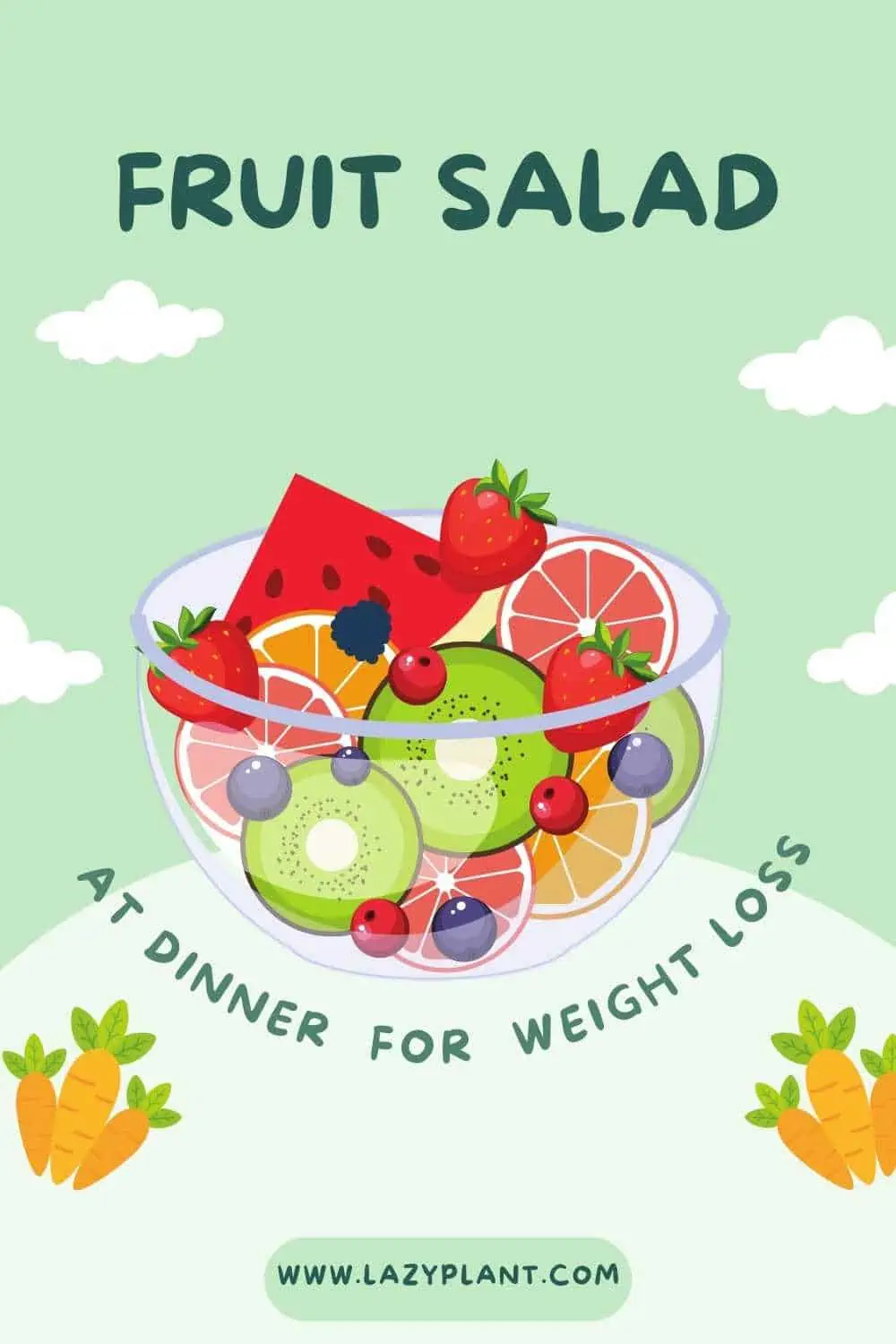
When should Eat a Fruit Salad for Weight Loss?
Fruit salad can be a versatile and nutritious option throughout the day in the Mediterranean diet.
Breakfast
Starting the day with a fruit salad provides essential vitamins, minerals, and fiber, promoting satiety and reducing cravings later in the day. It can boost energy levels and enhance metabolism, supporting weight loss goals. But, if combined with high-calorie toppings like sugary yogurts or granola, the calorie count may increase significantly.
Lunch
A fruit salad can serve as a light lunch or a refreshing side dish, keeping calories low while providing hydration and nutrients. It can help maintain energy levels without causing a midday slump. But, a fruit salad alone may not provide sufficient protein or healthy fats, leading to potential hunger before the next meal.
Snack
Fruit salad makes an excellent healthy snack, keeping calorie intake low while providing essential nutrients and fiber that curb hunger. It can prevent unhealthy snacking on high-calorie processed foods. But, some may find that fruit snacks lead to overeating if portion sizes are not controlled.
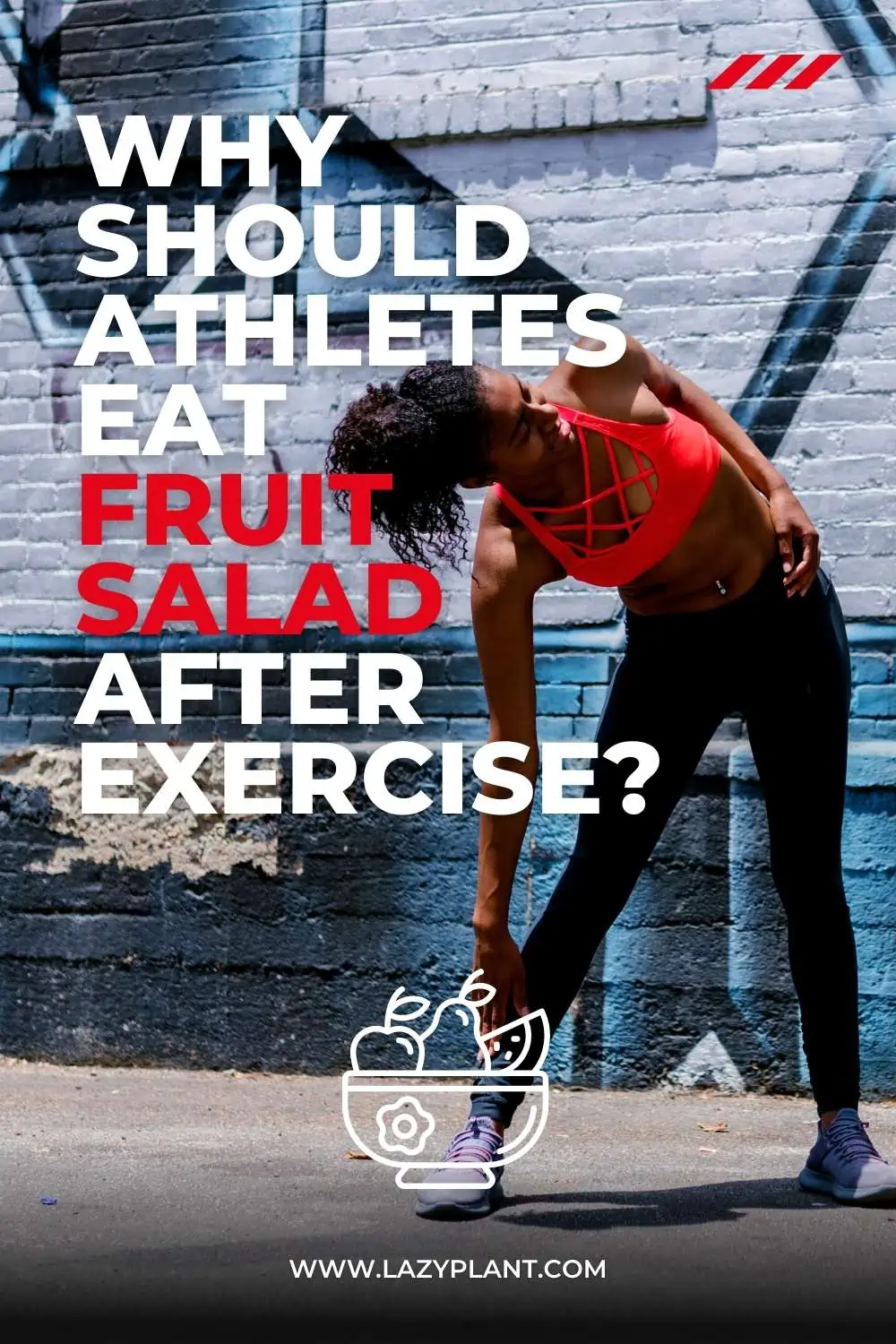
After the Gym
Consuming a fruit salad after a workout can offer numerous benefits, particularly when it includes a variety of fruits rich in antioxidants and other essential nutrients. After intense exercise, your body needs to restore glycogen levels. The natural sugars found in fruits, such as glucose and fructose, help replenish these energy stores quickly.
Many fruits have high water content, which helps rehydrate the body after a workout. Staying hydrated is crucial for recovery and overall performance. Moreover, potassium and magnesium are vital for muscle function and hydration.
Vitamin C plays a role in collagen synthesis, aiding muscle and tissue repair. Also, vitamin E has antioxidant properties that help combat oxidative stress induced by exercise.
Benefits of Specific Antioxidants
- Anthocyanins can reduce inflammation and muscle soreness after workouts, aiding recovery.
- Resveratrol has anti-inflammatory properties that can enhance muscle recovery and protect against oxidative stress.
- Carotenoids help reduce muscle inflammation and improve recovery times. According to studies, foods with lycopene are more beneficial for athletes than lycopene supplements.[14]
- Bromelain is an enzyme that is found in pineapple and is known for its anti-inflammatory properties. It can help reduce muscle soreness and improve recovery speed.
Preparation for Muscle Repair and Growth
To enhance muscle repair and growth, it’s important to combine your fruit salad with:
- Protein: Incorporate Greek yogurt, cottage cheese, or a protein shake into your fruit salad. These options not only provide high-quality protein for muscle repair but also complement the sweetness of the fruits.
- Healthy Fats: Add a sprinkle of nuts or seeds (like almonds, chia seeds, or flaxseeds) for healthy fats. They provide additional energy and help absorb fat-soluble vitamins.
- Whole Grains: If you prefer a more filling option, consider adding whole grains like quinoa or oats. These complex carbohydrates can further replenish energy stores and support muscle growth.
- Water: Pair your fruit salad with a hydrating beverage, such as coconut water or herbal tea, to help replenish electrolytes and maintain hydration.
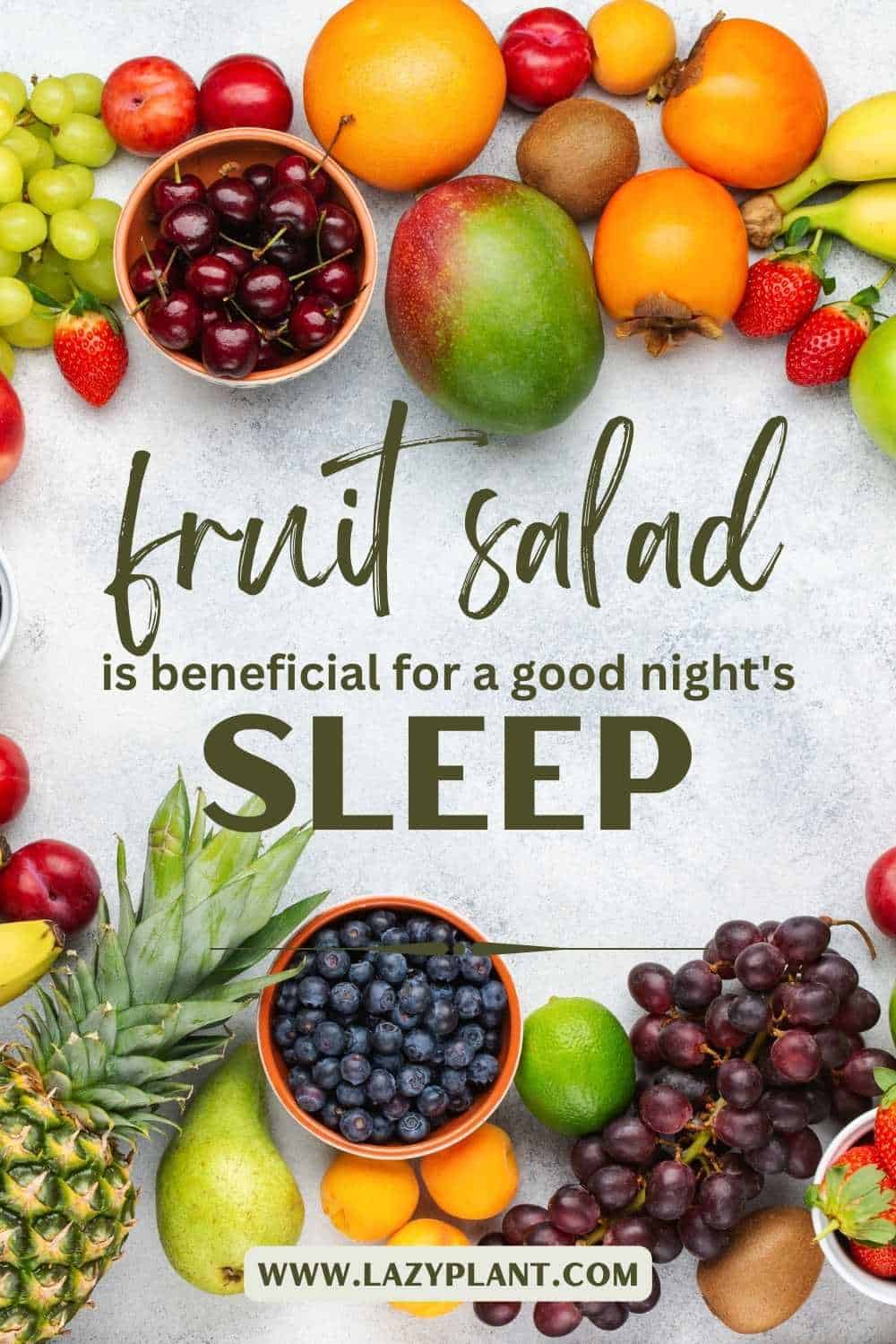
Dinner
A fruit salad is a light and refreshing option, low in calories, that can satisfy your sweet cravings without the heaviness of a full meal, making it an excellent choice for evenings. Fruit salads can help you avoid large meals that may disrupt your sleep.
They also promote healthy digestion, which can help prevent gastrointestinal issues and contribute to a restful night’s sleep. A fruit salad can provide 14% DV of fiber, which has been associated with better sleep quality with fewer arousals.[15]
Vitamin C in fruits plays a key role in increasing sleep duration, reducing sleep disturbances, and decreasing the dangerous effects of sleep apnea. It could prevent high cortisol or glucose levels induced by sleep deprivation.[16,17]
Adequate amounts of potassium are necessary for improved sleep quality, while magnesium affects sleep onset latency, snoring, sleep duration, early morning awakening, and daytime falling asleep. That’s why I try to add at least one of these fruits to my late-night fruit snack for extra magnesium: banana, avocado, or kiwi.[18,19]
Copper is another important trace mineral for sleep with the kiwis and grapes being great sources.[20]
Anthocyanins and resveratrol in fruits have potent neuroprotective properties. They help prevent sleep deprivation-induced problems, such as anxiety, and obesity.
Carotenoids may also improve sleep quality as well, due to their anti-oxidative and anti-inflammatory properties.[21]
I always add strawberries and cranberries to my evening fruit salad, as these are two of the richest foods in melatonin. Melatonin is the most important hormone for a good night’s sleep.
Tryptophan can improve sleep onset latency and total sleep quality. Oats, tuna, milk, and cheese, as well as certain seeds and nuts, are excellent dietary sources. You should combine these with your favorite fruit salad.
Tips for Better Sleep
- Choose Sleep-Promoting Fruits: Incorporate fruits high in melatonin (like cherries and bananas) and magnesium (like figs and avocados) into your salad.
- Add Healthy Fats: Including a small amount of nuts or seeds can provide magnesium and healthy fats that help promote satiety and improve sleep quality.
- Avoid adding heavy dressings or sugars that may interfere with digestion or lead to excessive calorie intake.
- Keep portion sizes moderate to avoid digestive discomfort before bed.
- Drinking water 30–60 minutes before dinner reduces total energy intake with huge benefits for obese adults who want to lose weight.[22]
- Don’t add dried fruits to your evening salad. The only time that I may consume them is right after strenuous exercise.
- Have dinner at least 2 hours before going to sleep. Eating right before bedtime is a risk factor for nocturnal awakenings and disrupted sleep.[23]
Mediterranean-Friendly Recipe Ideas
Mediterranean Berry Salad: Mix fresh blueberries, strawberries, and blackberries with a drizzle of honey and a sprinkle of crushed walnuts. Serve chilled.
Tropical Pineapple and Banana Salad: Combine fresh pineapple chunks, sliced bananas, and a dash of lime juice. Add a few mint leaves for freshness.
Citrus Melon Medley: Dice watermelon and cantaloupe, then mix with orange segments and a sprinkle of fresh mint. This refreshing salad is hydrating and perfect for dinner.
Cherry and Fig Delight: Combine halved cherries and sliced figs, then drizzle with a touch of balsamic vinegar for a unique flavor twist.
Avocado and Citrus Salad: Toss avocado cubes with grapefruit or orange segments, sprinkle with pomegranate seeds, and finish with a squeeze of lemon juice.
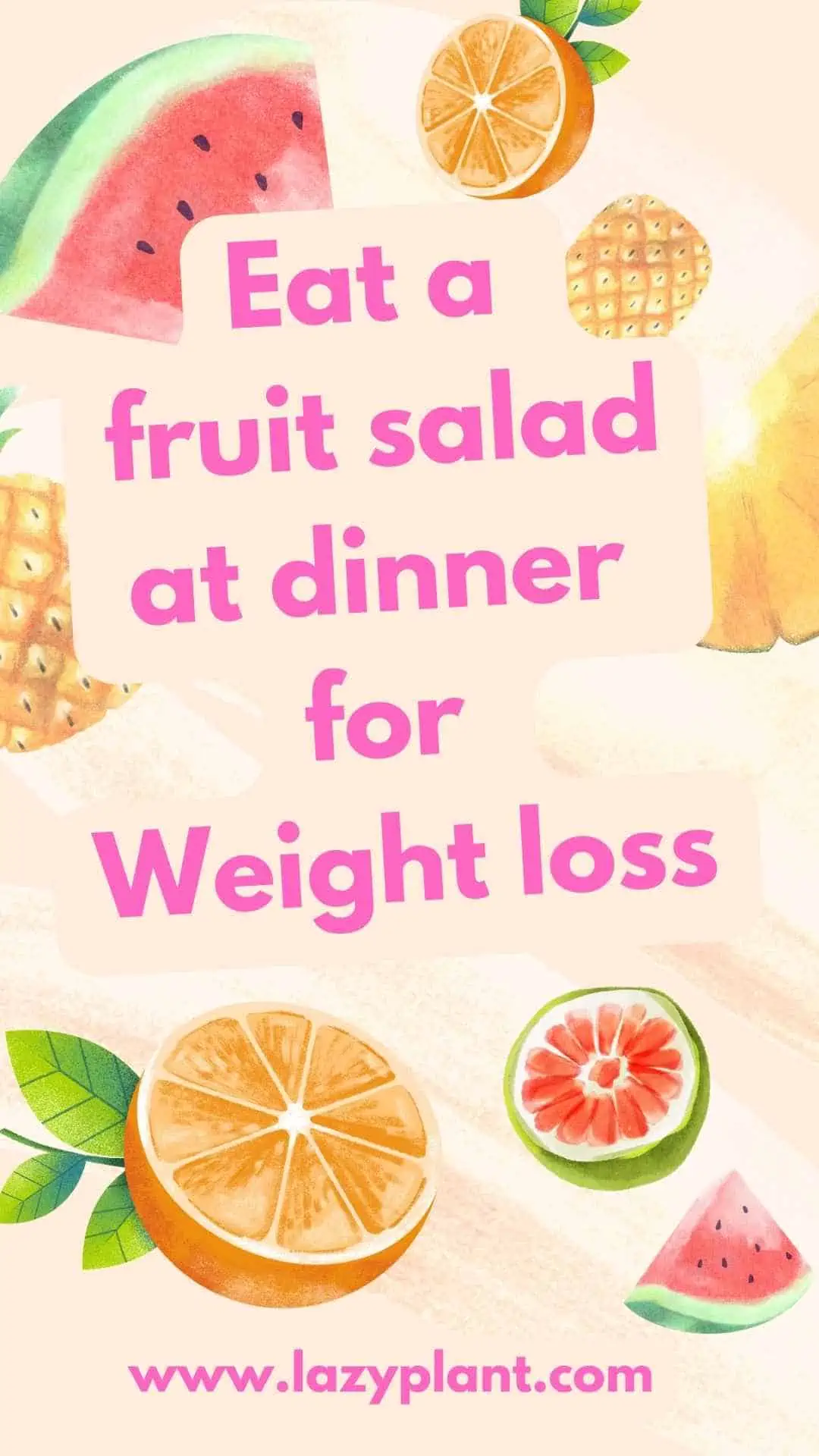
Tips for Cheap Fruit Salads
Buy in Season: Fruits that are in season tend to be fresher and cheaper. Seasonal fruits like berries in summer, apples and pears in fall, and citrus in winter can save you money.
Shop at Local Markets: Farmers’ markets or local fruit stands often offer lower prices and fresher produce compared to supermarkets. You can also find discounts on slightly bruised or ripe fruit, which are perfect for immediate use in salads.
Use Frozen or Canned Fruits: Frozen fruits, like berries and mango, are often cheaper and still nutrient-dense. Look for unsweetened canned fruits in water or their own juice as budget-friendly options.
Buy in Bulk: Purchase fruits in larger quantities, especially when they’re on sale. Divide them up for immediate use and store the rest properly.
Mix with Affordable Staples: Bulk up fruit salads with affordable fruits like bananas, apples, or oranges. These are often cheaper but still nutritious.
How to Store Fruits for Longer?
Refrigeration: Store berries, grapes, and citrus fruits in the refrigerator to extend their freshness. Apples, pears, and stone fruits like peaches and plums can also be refrigerated once ripe to prevent spoilage.
Freezing: Cut up excess fruit and freeze it for later use. Fruits like berries, mangoes, and peaches freeze well and can be used in smoothies or future fruit salads.
Separate Ethylene-Producing Fruits: Bananas, apples, and avocados produce ethylene gas, which speeds up the ripening process. Keep them separate from fruits like berries and citrus to avoid premature spoilage.
Use Airtight Containers: Store cut fruit in airtight containers in the fridge to keep them fresh longer. For berries, place them in a breathable container lined with paper towels to absorb moisture.
Drying: If you have too much fresh fruit, consider drying them. Dried fruits like apricots, apples, or bananas can last for months and are great for fruit salads.
How to Pick the Freshest Fruits?
Look for Firmness: Fresh fruits should feel firm but not hard, with no major soft spots or bruises.
Check the Color: Bright, vibrant colors usually indicate ripeness. For example, deep green stems on berries, or bright yellow skin on bananas, signal freshness.
Smell the Fruit: A fragrant aroma is a good indicator that the fruit is ripe and flavorful. This is especially true for fruits like pineapples and melons.
Inspect for Mold or Damage: Avoid fruits with mold, bruises, or cuts. Even a small damaged spot can cause the fruit to spoil faster.
Check the Weight: Heavier fruits tend to be juicier and more ripe. This is especially true for fruits like melons, oranges, and grapes.
Easy Fruit Salad Recipes following the Mediterranean Diet Principles
Classic Party Fruit Salad with Vanilla Pudding
- Ingredients:
- 2 cups pineapple chunks (fresh or canned in juice)
- 2 cups strawberries, halved
- 1 cup blueberries
- 1 banana, sliced
- 1 cup seedless grapes
- 1 small box sugar-free vanilla pudding mix
- 1 cup plain Greek yogurt (for added protein)
- Directions: In a large bowl, mix all the fruits. Sprinkle the vanilla pudding mix over the fruits and gently toss until the fruits are coated. Stir in Greek yogurt for added creaminess and protein. Refrigerate for an hour before serving.
Christmas or Thanksgiving Fruit Salad
- Ingredients:
- 2 red apples, diced
- 2 green pears, diced
- 1/2 cup dried cranberries
- 1/4 cup pomegranate seeds
- 1/2 cup walnuts (for healthy fats)
- 1 tbsp honey
- A pinch of cinnamon and nutmeg
- Directions: In a bowl, combine the apples, pears, cranberries, pomegranate seeds, and walnuts. Drizzle honey and sprinkle cinnamon and nutmeg. Toss to combine. Let it sit for 30 minutes for flavors to meld.
Fresh Summer Fruit Salad
- Ingredients:
- 2 cups watermelon cubes
- 1 cup cantaloupe cubes
- 1 cup fresh berries (blueberries, strawberries, raspberries)
- 1 peach, sliced
- Fresh mint leaves, chopped
- A squeeze of lime juice
- Directions: Combine all the fruits in a large bowl. Add chopped mint and lime juice for a refreshing twist. Serve chilled.
Fresh Winter Fruit Salad
- Ingredients:
- 2 oranges, segmented
- 1 grapefruit, segmented
- 1 apple, diced
- 1/2 cup kiwi slices
- 1/4 cup pistachios (for healthy fats)
- 1 tbsp lemon juice
- A drizzle of honey
- Directions: Toss all the fruits with lemon juice and honey. Top with chopped pistachios for a bit of crunch.
Tropical Fruit Salad
- Ingredients:
- 1 cup pineapple chunks
- 1 mango, diced
- 1 papaya, diced
- 1 banana, sliced
- 1/2 cup shredded coconut (unsweetened)
- Fresh lime juice
- Directions: Combine all the fruits in a large bowl. Sprinkle the shredded coconut and drizzle with lime juice. Serve chilled.
Ambrosia Fruit Salad (Mediterranean Version)
- Ingredients:
- 1 cup pineapple chunks
- 1 cup mandarin oranges (canned in juice)
- 1 cup coconut yogurt
- 1/2 cup shredded coconut (unsweetened)
- 1/4 cup slivered almonds (for healthy fats)
- 1/4 cup cherries (fresh or frozen)
- Directions: Mix all the fruits in a large bowl. Stir in coconut yogurt and top with shredded coconut and almonds. Refrigerate for an hour before serving.
Mexican Fruit Bowl
- Ingredients:
- 1 cup mango chunks
- 1 cup jicama slices
- 1/2 cup watermelon cubes
- 1/2 cup cucumber slices
- Fresh lime juice
- Chili powder (optional for a spicy kick)
- Directions: Toss all the fruits and veggies with lime juice and chili powder for a zesty, refreshing salad.
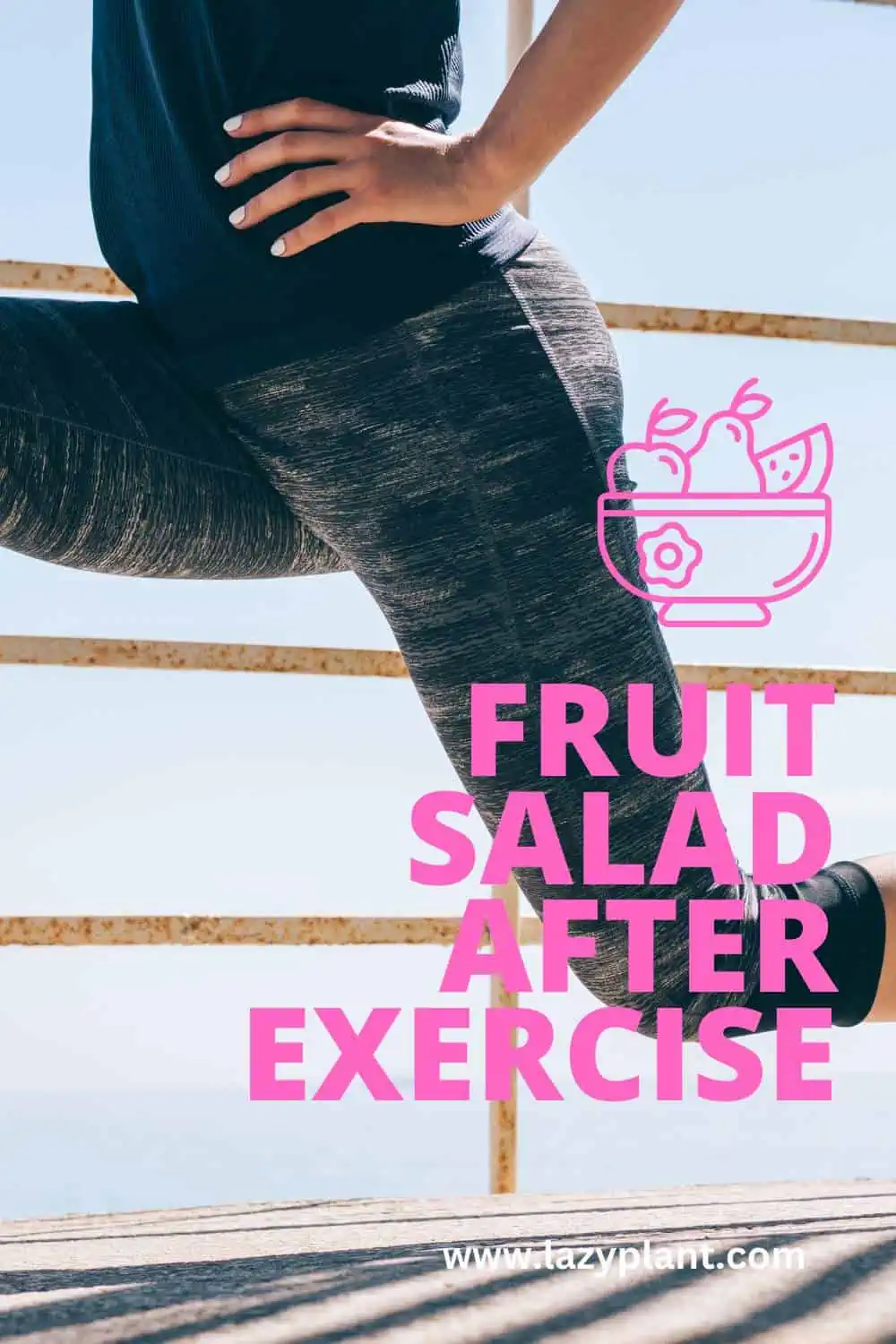
Protein-Boosted Fruit Salad
- Ingredients:
- 1 cup strawberries, halved
- 1/2 cup blueberries
- 1 banana, sliced
- 1/4 cup Greek yogurt (for protein)
- 1 tbsp chia seeds (for omega-3s)
- 1/4 cup walnuts or almonds (for healthy fats)
- Directions: Mix all the fruits in a bowl. Top with a dollop of Greek yogurt, sprinkle chia seeds and chopped nuts for added protein and healthy fats.
Protein-Packed Fruit Salad with Chicken
- Ingredients:
- 2 cups spinach or arugula
- 1/2 cup strawberries, halved
- 1/4 cup pomegranate seeds
- 1/2 avocado, diced
- 3 oz grilled chicken or turkey, sliced
- Olive oil and lemon juice dressing
- Directions: Layer spinach with fruits and avocado. Add the grilled chicken or turkey on top. Drizzle olive oil and lemon juice for a heart-healthy dressing.
Omega-3 Fruit Salad
- Ingredients:
- 1 avocado, diced
- 1 cup grapefruit segments
- 1/2 cup blueberries
- 1 tbsp flaxseeds or chia seeds (for omega-3s)
- A drizzle of olive oil
- Directions: Combine all fruits and sprinkle flaxseeds or chia seeds. Drizzle with olive oil for a salad rich in healthy fats and omega-3s. [the whole list of foods rich in Omega-3s]
Dressing Ideas
These dressings are not only easy to prepare but also enhance the flavors of fresh fruits while staying true to the Mediterranean diet’s focus on wholesome, nutrient-dense ingredients.
Strawberry Vinaigrette
- Ingredients:
- 1/2 cup fresh strawberries, hulled
- 1 tbsp balsamic vinegar
- 1 tsp honey or maple syrup
- 2 tbsp extra virgin olive oil
- Salt and pepper to taste
- Directions: Blend strawberries, balsamic vinegar, and honey until smooth. Slowly drizzle in olive oil while blending to emulsify. Season with salt and pepper. This sweet and tangy vinaigrette is perfect for fruit salads with berries or mixed greens.
Avocado Lime Dressing
- Ingredients:
- 1 ripe avocado
- Juice of 1 lime
- 1 tbsp olive oil
- 1/4 cup Greek yogurt (optional for creaminess)
- Salt and pepper to taste
- Directions: Mash the avocado and mix in lime juice and olive oil. Stir in Greek yogurt for a creamy texture. Season with salt and pepper. This creamy dressing pairs well with tropical fruit salads or citrus-based salads.
Mango Vinaigrette
- Ingredients:
- 1 ripe mango, peeled and chopped
- 2 tbsp apple cider vinegar
- 1 tbsp lime juice
- 1 tbsp honey
- 2 tbsp olive oil
- Directions: Puree the mango in a blender with vinegar, lime juice, and honey. Slowly add olive oil while blending. This dressing works beautifully with salads featuring tropical fruits like pineapple, papaya, or citrus.
Citrus Dressing
- Ingredients:
- Juice of 1 orange
- Juice of 1 lemon
- 1 tsp Dijon mustard
- 2 tbsp extra virgin olive oil
- 1 tsp honey
- Salt and pepper to taste
- Directions: Whisk together citrus juices, mustard, and honey. Slowly drizzle in olive oil while whisking to create a smooth dressing. Season with salt and pepper. Use this light, zesty dressing on melon, citrus, or mixed fruit salads.

Honey Lime Dressing
- Ingredients:
- Juice of 2 limes
- 2 tbsp honey
- 2 tbsp olive oil
- Zest of 1 lime (optional)
- Pinch of salt
- Directions: Whisk together lime juice, honey, and olive oil. Add lime zest for extra flavor. A refreshing, sweet dressing that pairs well with tropical fruit salads or berry-based dishes.
Pomegranate Vinaigrette
- Ingredients:
- 1/4 cup pomegranate juice (fresh or bottled)
- 1 tbsp red wine vinegar
- 2 tbsp extra virgin olive oil
- 1 tsp honey or maple syrup
- Salt and pepper to taste
- Directions: Whisk together pomegranate juice, vinegar, and honey. Gradually add olive oil while whisking. Season with salt and pepper. This slightly tart dressing enhances any salad with pomegranate seeds or citrus fruits.
Tahini Lemon Dressing
- Ingredients:
- 2 tbsp tahini
- Juice of 1 lemon
- 1 tbsp olive oil
- 1 tsp honey or maple syrup
- Pinch of salt
- Directions: Mix tahini, lemon juice, and honey until smooth. Slowly whisk in olive oil. This creamy, nutty dressing complements salads with pears, apples, and grapes, adding a rich Mediterranean touch.
Tahini is one of the healthiest foods you can eat daily. It’s my favorite spread.
Basil & Balsamic Dressing
- Ingredients:
- 1/4 cup balsamic vinegar
- 2 tbsp olive oil
- 1 tsp honey
- 1 tbsp fresh basil, finely chopped
- Salt and pepper to taste
- Directions: Combine balsamic vinegar and honey in a bowl. Slowly whisk in olive oil. Stir in chopped basil and season with salt and pepper. Ideal for fruit salads with berries, figs, or mixed greens.